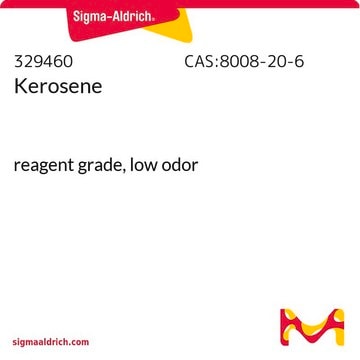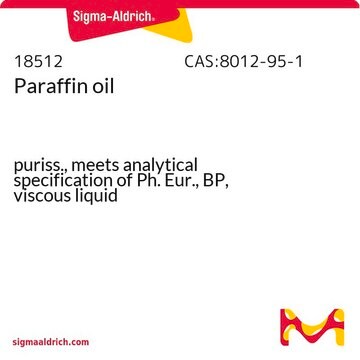54362
ICP solvent
for inorganic trace analysis, ≥99.9995% (metals basis)
Synonym(s):
Hydrotreated light distillate (petroleum)
About This Item
Recommended Products
grade
for inorganic trace analysis
Quality Level
Assay
≥99.9995% (metals basis)
technique(s)
AAS: suitable
ICP: suitable
bp
200-250 °C (lit.)
mp
-58 °C (lit.)
density
0.810-0.838 g/mL at 20 °C
anion traces
phosphate (PO43-): ≤1 mg/kg
sulfate (SO42-): ≤5 mg/kg
cation traces
Ag: ≤1 μg/kg
Al: ≤1 μg/kg
As: ≤1 μg/kg
Au: ≤1 μg/kg
Ba: ≤0.5 μg/kg
Be: ≤0.5 μg/kg
Bi: ≤0.5 μg/kg
Ca: ≤20 μg/kg
Cd: ≤0.5 μg/kg
Ce: ≤0.5 μg/kg
Co: ≤0.5 μg/kg
Cr: ≤1 μg/kg
Cu: ≤1 μg/kg
Fe: ≤5 μg/kg
Ga: ≤0.5 μg/kg
Ge: ≤0.5 μg/kg
In: ≤0.5 μg/kg
Ir: ≤0.5 μg/kg
K: ≤10 μg/kg
Li: ≤0.5 μg/kg
Mg: ≤1 μg/kg
Mn: ≤0.5 μg/kg
Mo: ≤0.5 μg/kg
Na: ≤10 μg/kg
Ni: ≤1 μg/kg
Pb: ≤0.5 μg/kg
Pd: ≤1 μg/kg
Pt: ≤0.5 μg/kg
Rb: ≤0.5 μg/kg
Rh: ≤0.5 μg/kg
Ru: ≤0.5 μg/kg
Sb: ≤0.5 μg/kg
Sn: ≤0.5 μg/kg
Sr: ≤0.5 μg/kg
Ti: ≤1 μg/kg
Tl: ≤0.5 μg/kg
U: ≤0.5 μg/kg
V: ≤0.5 μg/kg
Zn: ≤50 μg/kg
Zr: ≤0.5 μg/kg
Application
Signal Word
Danger
Hazard Statements
Precautionary Statements
Hazard Classifications
Asp. Tox. 1
Storage Class Code
10 - Combustible liquids
WGK
WGK 1
Flash Point(F)
158.0 °F
Flash Point(C)
70 °C
Choose from one of the most recent versions:
Already Own This Product?
Find documentation for the products that you have recently purchased in the Document Library.
Customers Also Viewed
Our team of scientists has experience in all areas of research including Life Science, Material Science, Chemical Synthesis, Chromatography, Analytical and many others.
Contact Technical Service







